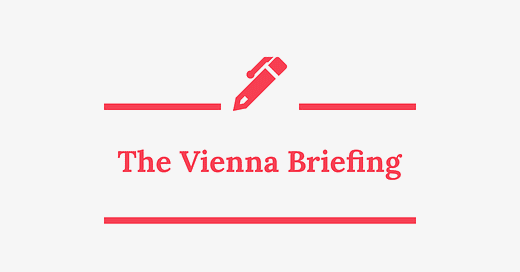It's Doskozil. Or Is It?
Hans Peter Doskozil won the Social Democratic Party's leadership contest but only captured 33.68 percent of the vote. A showdown at June's party conference beckons
Servus!
I was quite right not to have predicted the outcome of the Social Democratic Party (SPÖ)’s leadership contest. The result was closer than many could have imagined. Shortly after 17:00 yesterday, the head of the party’s electoral commission announced that Burgenland governor Hans Peter Doskozil had won the race—but only with 33.68 percent of the vote. Traiskirchen mayor Andreas Babler came in second on 31.51 percent, and incumbent Pamela Rendi-Wagner third on 31.35 percent. 3.46 percent of the selectorate opted for the fourth option: none of the above.
The first candidate to put their head above the parapet was Babler who, one hour after the result was announced, said at an after-party held by the Danube that 33.68 percent was not enough to declare Doskozil the true winner. A real mandate would demand 50 percent plus one, and thus the election should go to a run-off vote among the membership. Babler really does believe in greater party democracy, but his call to, in essence, change the rules of the game because the outcome was not his desired one rather smacked of poor sportsmanship.
At 19:00, Doskozil—who had spent the day in Burgenland opening an extension to the outlet mall at Parndorf, among other things—stepped in front of the press. Wiping the sweat from his forehead, the governor, as was to be expected, declared victory. Appearing to dismiss Babler’s proposal for a run-off, Doskozil said the members had voted and their choice had to be respected. A relative majority of members had indeed plumped for Doskozil. Two-thirds, of course, had not.
Last but not least, the incumbent. Rendi-Wagner waited until 9:30 this morning to make her statement at a press conference held in parliament. She too said the outcome had to be respected, and in doing so announced she would not stand as a candidate when the leadership question comes before delegates to an extraordinary party conference in Linz on June 3. She will resign as party leader and leader of the SPÖ parliamentary party. She did not address if she intends to give up her seat in parliament and leave politics altogether.
Thank you for subscribing to the Vienna Briefing. If you know someone who might be interested in receiving this newsletter, consider sharing it with them today.
The Vienna Briefing is a reader-supported publication. If you would like to support my work, think about sending me a tip via PayPal. Thank you to all contributors.
Rendi-Wagner’s statement came as members of the SPÖ’s national executive committee started to arrive in parliament ahead of a meeting at which the way forward for the leadership contest would be decided. This election, remember, was always cast by the party’s chief executive Christian Deutsch—whose days in office are surely numbered—as a Stimmungsbild, a taking of the political temperature, a non-binding vote that would give delegates to conference an indication of the mood among members and a direction in terms of which way to vote.
More than failing to build a run-off into the contest’s rules—which is somewhat understandable as they were designed with two contestants in mind—not making the vote binding was the SPÖ’s biggest mistake. It created an opening for someone to throw a spanner in the works. The most up-to-date rumor out of party headquarters is that Babler will stand for the leadership at conference on June 3. This is far from the seamless transition from one leader to the next that party grandees would have hoped for. Instead, the SPÖ will have itself a bloody battle on the conference floor.
The future for the SPÖ, then, remains uncertain. But what’s past is past, and the Rendi-Wagner era is over. Four-and-a-half years ago, former chancellor Christian Kern abruptly resigned as SPÖ leader, leaving the party in the lurch. Casting around for a replacement, at a time when no one else desired the mantle, Rendi-Wagner stepped up to grab it. It was to her credit that she did so—and to the discredit of the stiffs who run the party that they allowed her to do so.
Rendi-Wagner was hamstrung by her own limitations. A technocratic former health minister, she was wooden and impersonal in public and failed to articulate a vision for the SPÖ either in word or deed. It was never clear what the ‘S’ in SPÖ stood for. An outsider to party politics, she also displayed little aptitude for the bump and grind of factional politics. In 2019, she led the SPÖ to its worst national election result in its history; were it not for the backing of the Vienna SPÖ, she would have gone down with the ship. Perhaps she should be grateful that the leadership contest played out the way it did, for it affords her a more dignified end than she ever could’ve hoped for.
Bis bald!



